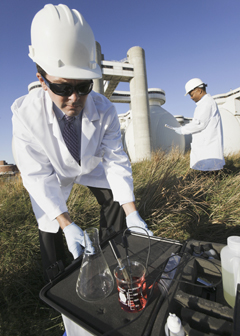Summary

| Quick Facts: Environmental Engineering Technicians | |
|---|---|
|
$43,390 per year
$20.86 per hour |
|
| Associate’s degree | |
| None | |
| None | |
| 18,800 | |
| 24% (Faster than average) | |
| 4,600 | |
What Environmental Engineering Technicians Do
Environmental engineering technicians carry out the plans that environmental engineers develop. They test, operate, and, if necessary, modify equipment for preventing or cleaning up environmental pollution. They may collect samples for testing, or they may work to mitigate sources of environmental pollution.
Work Environment
Nearly all environmental engineering technicians work full time. They typically work indoors, usually in laboratories, and often have regular working hours. However, they must sometimes work irregular hours to monitor operations.
How to Become an Environmental Engineering Technician
Although environmental engineering technicians do not necessarily need an associate’s degree, employers prefer candidates who have one.
Pay
The median annual wage of environmental engineering technicians was $43,390 in May 2010.
Job Outlook
Employment of environmental engineering technicians is expected to grow 24 percent from 2010 to 2020, faster than the average for all occupations. Employment in this occupation is typically tied to projects created by environmental engineers. State and local governments are expected to focus efforts and resources on efficient water use and wastewater treatment, which will support the demand for environmental engineering technicians.
Similar Occupations
Compare the job duties, education, job growth, and pay of environmental engineering technicians with similar occupations.
O*NET
O*NET provides comprehensive information on key characteristics of workers and occupations.
Contacts for More Information
Learn more about environmental engineering technicians by contacting these additional resources.







